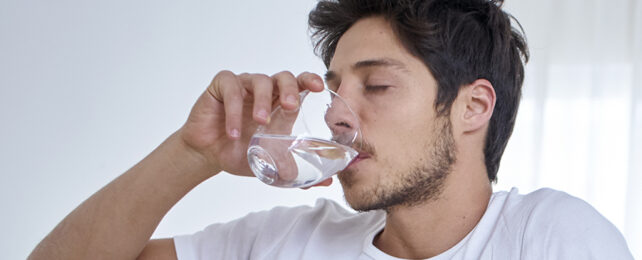Of all the advice on preventing hangovers, drinking water to prevent dehydration seems like the most sensible. A new study has found no evidence to support claims that drinking a generous amount of water after a night of boozing alleviates the pain the next day.
An international team of researchers led by Utrecht University pharmacologist Marlou Mackus analyzed data collected in 13 previous investigations, searching for any hint of a relationship between dehydration and alcohol consumption or between drinking water and the intensity of a hangover.
While there's no single cause of hangovers, alcohol has a diuretic effect on our body, increasing the production of urine. This increases the risk of dehydration, which we might imagine to be behind the head and body aches, stomach-churning nausea, and general malaise of a hangover. Many people also report feeling thirsty and having a dry mouth in the morning after an evening on the booze the night before.
Naturally, topping up that lost fluid ought to stave off those symptoms.
While the data didn't rule out dehydration and hangovers occurring simultaneously, there was no evidence of the two being directly linked. One isn't causing the other, which means replacing any lost water won't have much of an effect on the worst parts of a hangover.
"This review concludes that hangover and dehydration are two co-occurring but independent consequences of alcohol consumption," the researchers write in their published paper.
One of the studies involved 826 students, some of whom tried to mitigate their hangovers by drinking water. However, the effectiveness of the water drinking was only very slight in terms of relieving hangovers.
In another study reviewed by the researchers, 29 participants aged between 18 and 30 reported on hangover severity and levels of thirst the day after a drinking session. It was shown that a feeling of dehydration didn't last as long as other hangover symptoms.
"While hangovers were typically relatively enduring, dehydration effects were usually mild and short-lasting," write Mackus and her team. "Survey data revealed that water consumption during or directly after alcohol consumption had only a modest effect in preventing a next-day hangover."
"Also, the amount of water consumed during a hangover was not related to changes of hangover severity and thirst."
It's important to bear in mind that each of the reviewed studies were based on relatively small numbers of people. What's more, they all studied different aspects of hangovers – such as why some people experience them more regularly than others – rather than focusing directly on drinking water as a hangover prevention method.
Despite the limitations, it appears necking a few glasses of water isn't going to save you from your hangover, a finding that's backed up by previous studies suggesting that while drinking water may counter some of the effects of dehydration, it won't clear up other hangover symptoms (like a pounding headache).
"Taken together, the discussed studies suggest that the consumption of water during or directly after the drinking session is not effective in preventing hangovers, and that the amount of water consumed during the hangover day is not significantly related to changes in hangover severity," write the researchers.
The research has been published in Alcohol.
